Search
Mathematics BSc (Hons)
Study level: Undergraduate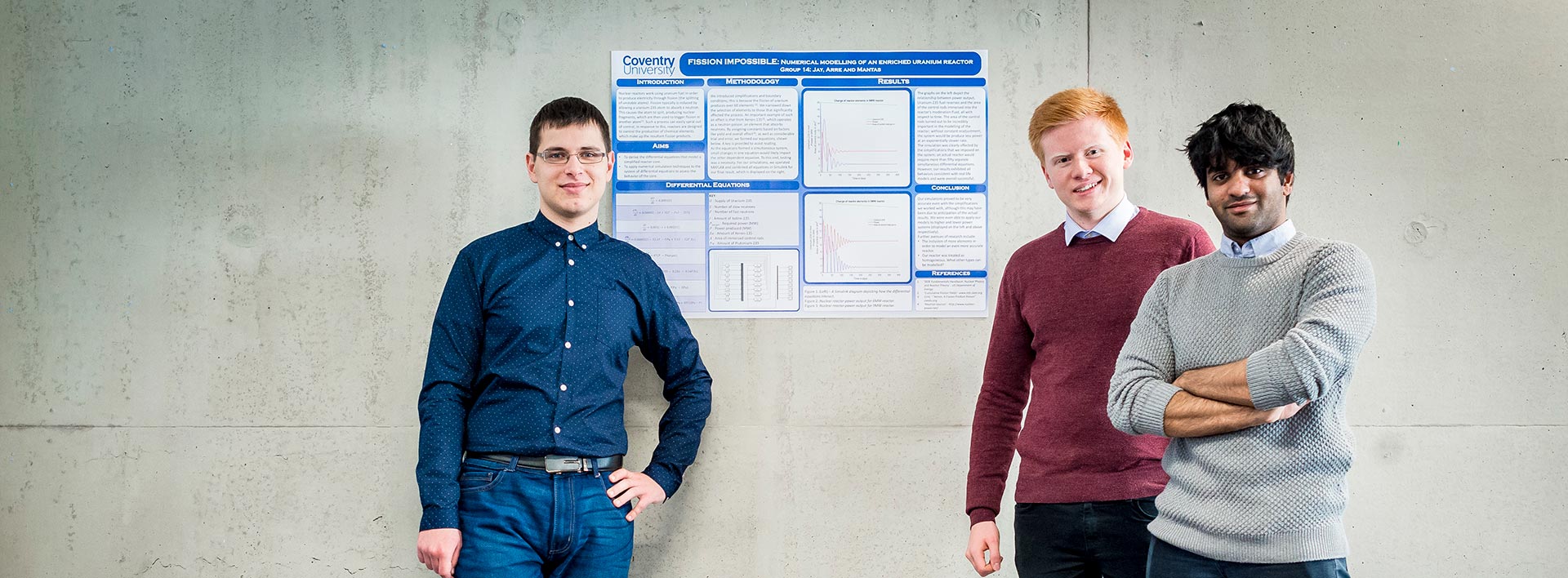
If you are curious about numbers and how they are used practically in the ‘real world’, a Mathematics BSc can lead you down many career paths.
Course features
Course option
Year of entry
Location
Coventry University (Coventry)
Study mode
Full-time
Sandwich
Duration
3 years full-time
4 years sandwich
UCAS codes
G100
Start date
September 2025
The information on this page is for 2024-25 entry and should be used as guidance for 2025-26 entry. Please keep checking back on this course page to see our latest updates.
Course overview
The course is currently taught by a team of internationally renowned research-active academics who are focused on enabling you to succeed.
Mathematics is an ancient subject that, from its earliest days, has underpinned much of daily life, in finance, commerce, science, technology, engineering and even philosophy – from understanding the structure of the universe and predicting earthquakes to interpreting error-correcting codes on digital devices and enabling us to stream music and video.
This course is designed to enable you to:
- Gain expertise in advanced analytical and numerical techniques for mathematical formulation and quantitative solution of real-world problems.
- Hone abstract reasoning and critical thinking skills to become a globally competent mathematician aware of your social responsibilities.
- Become adept at quickly learning new complex ideas and confidently contributing solutions via personal impact and effective collaboration.
Joint Top Modern University for Career Prospects
Guardian University Guide 2021 and 20225 QS Stars for Teaching and Facilities
QS Stars University RatingsTop 5 UK Student City (Coventry)
QS Best Student Cities Index 2023Why you should study this course
- You will be taught by a teaching team that includes active world-renowned researchers in applied mathematics with expertise in fluid dynamics and complex systems, who share their cutting-edge research expertise through teaching and supervising projects (staff subject to change).
- The teaching team is passionate about and oriented towards the success and well-being of their students.
- Our faculty links with potential employers, including National Grid, MathWorks, Unipart, Rolls-Royce and Jaguar Land Rover, help us to maintain an excellent track record for graduate employability2.
- You will have the opportunity to access our computing facilities, which enable you to gain experience using mathematical software packages, like MAPLE and MATLAB®4.
- You will have the option to access one-to-one assistance from sigma4, the university’s internationally renowned Centre for Excellence in Mathematics and Statistics Support.
Accreditation and professional recognition
Accreditation for the degree is being renewed as we are making some changes to our modules1.
What you'll study
Advanced mathematical concepts; abstract reasoning; critical thinking; learning to learn new ideas; collaboration and teamwork.
We regularly review our course content, to make it relevant and current for the benefit of our students. For these reasons, course modules may be updated.
How you'll learn
Learning will be facilitated through a variety of methods which may include lectures, seminars, lab, workshops, online activities and group work.
Students are expected to engage in both class and online activities and discussions. This module also requires students to participate in additional guided reading and self-directed study to reinforce the learning gained from timetabled sessions.
Formative feedback will be used to prepare students for summative assessment and give students an early indication of their progress towards the module's intended learning outcomes. A portion of this module’s contact time will be dedicated to course support sessions. The course support sessions are weekly, timetabled sessions where students can explore areas of the course which they find challenging or get support with personal projects and employability efforts (subject to availability).
Teaching contact hours
We understand that everyone learns differently, so each of our courses will consist of structured teaching sessions, which can include:
- On campus lectures, seminars and workshops
- Group work
- Self-directed learning
- Work placement opportunities2.
The number of full-time contact hours may vary from semester to semester, however, on average, it is likely to be around 12 contact hours per week. Additionally, you will be expected to undertake significant self-directed study each week of more than 30 hours, depending on the demands of individual modules.
The contact hours may be made up of a combination of face-to-face teaching, individual and group tutorials, and online classes and tutorials.
As an innovative and enterprising institution, the university may seek to utilise emerging technologies within the student experience. For all courses (whether on-campus, blended, or distance learning), the university may deliver certain contact hours and assessments via online technologies and methods.
Since COVID-19, we have delivered our courses in a variety of forms, in line with public authority guidance, decisions, or orders and we will continue to adapt our delivery as appropriate. Whether on campus or online, our key priority is staff and student safety.
Assessment
This course will be assessed using a variety of methods which will vary depending upon the module.
Assessment methods may include:
- Formal examinations
- Phase tests
- Essays
- Group work
- Presentations
- Reports
- Projects
- Coursework
- Individual assignments
The Coventry University Group assessment strategy ensures that our courses are fairly assessed and allows us to monitor student progression towards achieving the intended learning outcomes.
International experience opportunities
If you have a desire to gain international experience, there are opportunities2 to spend a year studying abroad. In the past, students have chosen to study Mathematics in St Marcus University in California, University of Malta, Stockholm University in Sweden, also universities in the Netherlands, Germany and Australia. Courses in all these Universities have been delivered in English.
The opportunity for a sandwich placement means we aim to support you in finding an internship and in seeking ways to finance that experience. Past students have gone to work in countries such as Malaysia, Belgium, and Spain.
Entry requirements
Typical offer for 2024/25 entry.
Not got the required grades? We offer this degree with an integrated foundation year.
Fees and funding
| Student | Full-time | Part-time |
|---|---|---|
| UK, Ireland*, Channel Islands or Isle of Man | 2025/26 fees TBC 2024/25 fees - £9,250 per year |
Not available |
| EU | 2025/26 fees TBC 2024/25 fees - £9,250 per year with EU Support Bursary** 2025/26 fees TBC 2024/25 fees - £19,850 per year without EU Support Bursary** |
Not available |
| International | 2025/26 fees TBC 2024/25 fees - £19,850 per year |
Not available |
If you choose to study this course with a professional placement2 or study abroad year, you will need to pay a tuition fee3 of £1,250 to cover your academic support throughout your placement year.
For advice and guidance on tuition fees and student loans visit our Undergraduate Finance page and see the university’s Tuition Fee and Refund Terms and Conditions.
The university will charge the tuition fees that are stated in the above table for the first Academic Year of study. The university will review tuition fees each year. For UK (home) students, if Parliament permits an increase in tuition fees, the university may increase fees for each subsequent year of study in line with any such changes. Note that any increase is expected to be in line with inflation.
For international students, we may increase fees each year, but such increases will be no more than 5% above inflation. If you defer your course start date or have to extend your studies beyond the normal duration of the course (e.g. to repeat a year or resit examinations) the university reserves the right to charge you fees at a higher rate and/or in accordance with any legislative changes during the additional period of study.
We offer a range of International scholarships to students all over the world. For more information, visit our International Scholarships page.
Tuition fees cover the cost of your teaching, assessments, facilities and support services. There may be additional costs not covered by this fee such as accommodation and living costs, recommended reading books, stationery, printing and re-assessments should you need them.
The following are additional costs not included in the tuition fees:
- Any optional overseas field trips or visits: £400+ per trip.
- Any costs associated with securing, attending or completing a placement (whether in the UK or abroad).
Find out what's included in your tuition costs.
*Irish student fees
The rights of Irish residents to study in the UK are preserved under the Common Travel Area arrangement. If you are an Irish student and meet the residency criteria, you can study in England, pay the same level of tuition fees as English students and utilise the Tuition Fee Loan.
**EU Support Bursary
Following the UK's exit from the European Union, we are offering financial support to all eligible EU students who wish to study an undergraduate or a postgraduate degree with us full-time. This bursary will be used to offset the cost of your tuition fees to bring them in line with that of UK students. Students studying a degree with a foundation year with us are not eligible for the bursary.
Facilities
The School of Computing, Mathematics and Data Science is based in the Engineering and Computing Building, and the attached Beatrice Shilling Building. Both buildings are high-specification learning environments that benefit from extensive social learning facilities, well-appointed laboratories, lecturing facilities and classrooms, facilitating our innovative teaching methods across a diverse suite of undergraduate and postgraduate courses4.
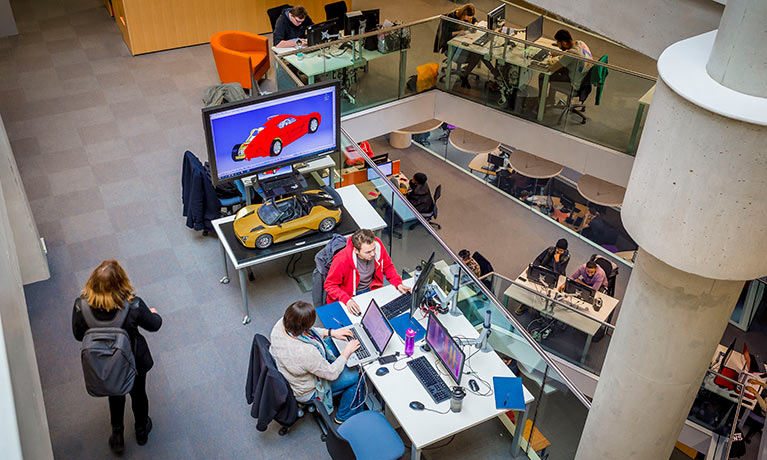
Informal study areas
You will have plenty of computer access to all the specialist software required for your studies. There are also bookable spaces where students can meet with academics or work in small groups.
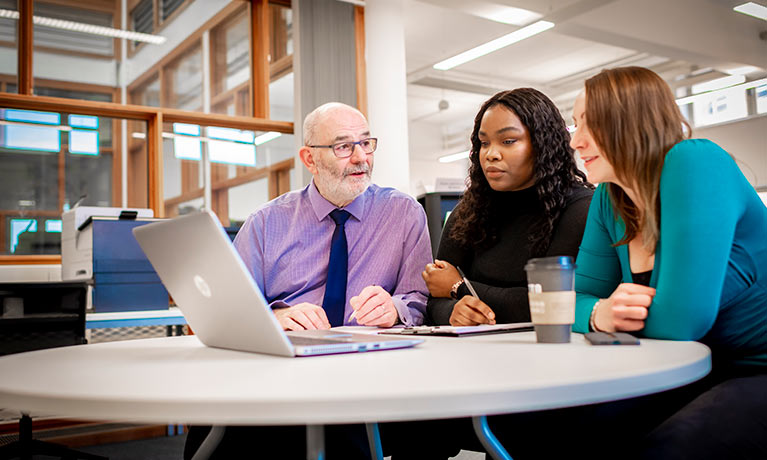
sigma Centre
The sigma Centre is an award-winning mathematics support centre, which provides a wide range of learning resources in mathematics and statistics. Students can make use of drop-in sessions or one-to-one appointments.
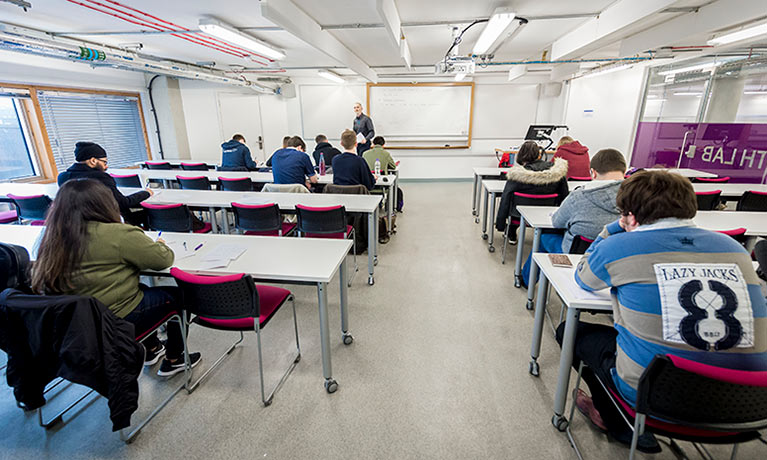
Mathematics laboratory
Set out like a traditional classroom with a large whiteboard, it is the only teaching room in the Engineering and Computing Building laid out in this way, designed to suit the teaching style required for this subject.
Careers and opportunities
On successful completion, you will have knowledge of:
- The logical construction of a mathematical argument.
- The application of mathematics to construct models and their resolution, with an appreciation of the validity of the model and the use of approximation.
- The use of a range of analytic and descriptive techniques.
- The strengths and weaknesses of selected mathematical software and selected programming or scripting languages and their use to extend capabilities.
- A range of real-world applications of mathematics.
On successful completion, you will be able to:
- Understand, reproduce, and generalise logical mathematical reasoning.
- Organise and interpret information and results from mathematical models.
- Analyse problems and construct an appropriate formulation and solution with relatively little guidance or support.
- Use specialist modern information technology packages and a programming language confidently.
- Use a wide range of information resources to acquire relevant information.
Studying maths develops skills in logical thinking and strategic knowledge, demonstrating to employers your advanced numerical and analytical ability, both of which are rare and in demand on the graduate job market.
A mathematics degree opens a range of career opportunities in industry, accountancy, banking, computer analysis, marketing, industrial design, management, and scientific research. You could be employed in a variety of roles, for example, as an actuarial analyst, actuary, forensic accountant, operational researcher, research scientist, teacher, statistician, or stockbroker.
Where our graduates work
Previous students have worked as Financial Analysts at IBM, Gaming Financial Analysts for Warner Bros, Finance Assistants at Scottish Power, Business Performance Process Analysts at National Grid, Power Analysts at E.ON, and Customer Service Analysts for Cummins.
Recent graduates have embarked on Finance Graduate Schemes, as a Customer Services Analyst, Graduate Actuary, Information Analyst and Trainee Accountants for companies like E-On, National Grid, Thames Water, NHS, Hodge Lifetime Solutions and Prime Accountants. Others have also used their qualifications to progress into teaching careers, as well as postgraduate study to obtain MSc, MPhil, and PhD qualifications.
Further study
You may decide to pursue postgraduate study opportunities by studying courses such as Data Science MSc. You may be entitled to an alumni discount on your fees if you decide to extend your time with us by progressing from undergraduate to postgraduate study.
Graduate Immigration Route visa
Based on current information from the UK Government, international students whose study extends beyond summer 2021 may be eligible for a visa under the UK Government’s Graduate Immigration Route, which will enable students to stay and work, or look for work, in the UK at any skill level for up to two (2) years. Check the most up to date guidance available to check your eligibility and any updates from the UK Government before making an application or enrolment decision.
How to apply
You may also like
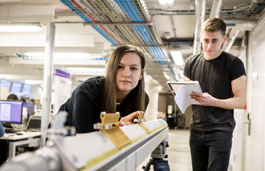
Physics and Mathematics BSc (Hons)




